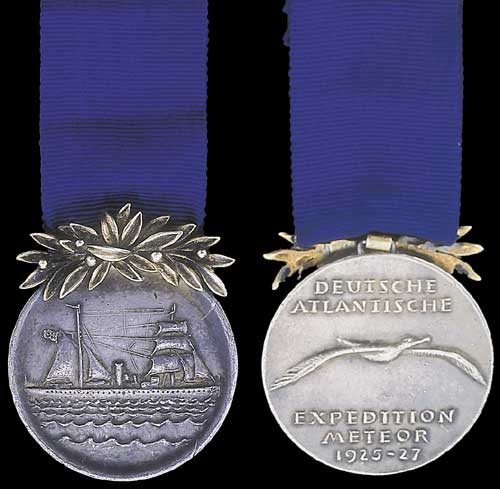
Auction: 5005 - Orders, Decorations, Campaign Medals and Militaria
Lot: 364
Germany, German Atlantic Expedition 1925-27, First Class medal, 51mm., silver with gilt oak leaves suspension, obverse, view of the Meteor under sail, reverse, an albatross, DEUTSCHE ATLANTISCHE EXPEDITION METEOR 1925-27, the edge stamped BAYER HAUPTMUNZAMT. FEINSILBER, very fine, very rare, with plain blue riband Estimate £ 300-400 The German Atlantic Expedition One of the most important oceanographic expeditions of the twentieth century was that undertaken by the survey ship Meteor. Laid down as an Iltis-class gunboat and launched in 1915, Meteor remained incomplete at the end of the Great War. With vigorous naval backing, Dr. Alfred Merz developed a programme for a systematic description of the meteorological, chemical, and topographical attributes of the Atlantic Ocean. Fitted with a brigantine rig to reduce reliance on fuel, Meteor was completed in 1925 and the expedition departed in April that year. Unfortunately Dr. Merz had to be landed in Buenos Aires where he died of a lung condition. The Meteor traversed the Atlantic Ocean fourteen times to generate profiles of the ocean between 20·N and 55·S. Working at 310 hydrographic stations, her scientists used 67,400 echo soundings to map the topography of the ocean floor and made 9,400 measurements of temperature, salinity and chemical content at varying depths. Analysis of the latter established the pattern of ocean water circulation, nutrient dispersal, and plankton growth. The expedition was also the first to make extensive studies of surface evaporation.
After her return to Germany in 1927, Meteor was used for research and fisheries protection. After World War II, she was taken over by the Soviet Union and renamed Ekvator. As late as 1972 she was still in service as a barracks ship in the Baltic.
The medal was awarded by The Research Aid Society of German Science. 23 First Class medals, with gilt oakleaves, were awarded to officers and civilian scientists. 188 Second Class medals, with silver oakleaves, were awarded to the crew. The Meteor carried 130 officers and crew, so one must assume that men were switched out during the voyage, and perhaps others connected with the expedition (but not on board) were eligible for the award. (F. Spiess ´The Meteor Expedition´ , Berlin 1927, refers.)
Sold for
£500




